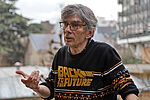This group focuses on the study of public perception of geothermal projects, analyses of scientific controversies, and mediation devices (surveys and public debates). To do this, the group uses sociological surveys (questionnaires, interviews, focus groups) and analyses of the media.
Achievements
The group has been working following the 4 main axes:
1. Analysis of society’s role in shaping Alsatian geothermal projects. In Alsace, deep geothermal energy has been developed regionally through negotiations between a multitude of collective stakeholders, with some discussions that have included local political representatives from the outset. This involvement gives rise to what we have described as "locally anchored projects" that, in comparison to other projects, raise the fewest challenges. Conversely, so-called “rootless” projects do not initially integrate local political representatives. Based on this observation, the group uses participant observation methods and comprehensive interviews to analyze past and on-going consultation efforts surrounding geothermal power plant projects in Alsace.
2. Study of the public image of geological projects. This axis takes advantage of an existing collection - compiled as part of the H2020 DESTRESS program - of nearly 3,500 media articles from the national, regional, and local Alsatian press published between 2002 and 2018. This collection is being expanded to include press articles addressing emerging energy sectors (e.g. CO2 storage, lithium, hydrogen, etc.). The analysis of this body of work makes it possible to assess: 1) how the links between national energy policies and local projects are addressed publicly, 2) the ways in which these links are framed (e.g. political, economic, social, environmental) on a project-by-project basis, and how the media popularises and re-contextualises these projects.
3. Public perception of consultation efforts and local democracy. Consultation efforts are not always acceptable to residents who sometimes call into question the terms of these efforts. We propose to carry out a critical inventory of consultation mechanisms mobilized in the Grand Est region since 2010. This inventory will be followed by a sociological study of residents carried out using focus groups. This approach will determine the predominant expectations of citizens of the governance of underground energy projects. Symmetrically, the group analyses the forms of communication favored by proponents of deep geothermal energy and emerging renewable energy sectors, as well as by local government.
4. Implementation of a “citizen seismology” network. This research is based on an experiment in citizen seismology initiated in the autumn of 2018 in the Mulhouse region. As part of this initiative, a network of low-cost seismometers were installed in private residences in an effort to densify the existing seismic network while assessing how public perception of the geosciences changes as a function of public involvement. Since the, the deployment of this network has drastically increase including the Eurométropole a,d North Alsace regions through the ANR PrESENCE and SismoCité projects. In addition to individual residents, a set of town halls will also be included in the network. This work is essential to the creation of a participatory research tool that fosters local knowledge-development, and facilitates local consultation on and the implementation of future projects.

see the participative science page for more information
Team
Leader: Philippe Chavot (LISEC)
- Members (LISEC/CREM/SAGE): Yenny Serrano, Aanne Masseran, Jean Zoungrana, Chloé Laffont
- PhD candidates: Jérôme Arnaud, Morgane Platon
Collaborations
With the other ITI GeoT WGs:
WG1: Seismology
With other academic partners:
The involvement of the group in the the PEPR sous-sol PC7 implies the elaboration of a broad collaboration with an interdisciplinary group of researchers (geographers, political scientists, historians, sociologists, information-communication researchers, etc.) addressing the issue of the politicization of the subsoil from different perspectives.
With socio-economic partners:
Jardin des sciences, Musée du Pétrole de Pechelbroon
Publications
Public Engagement, Changes in the Governance and the Requalification of High-Energy Geothermal Projects in France. Chavot, P., Masseran, A., Serrano, Y., Arnaud, J., Zoungrana, J. (2025). Geothermal Energy and Society. https://doi.org/10.1007/978-3-031-81920-9_9
Une expérience personnelle des séismes : Étude des commentaires sur les réseaux socionumériques autour de la géothermie en Alsace. Jérôme Arnaud, Philippe Chavot, Yeny Serrano, Anne Masseran (2025). Vertigo. https://doi.org/10.4000/13asf
L'implicite de l'"acceptabilité". La géothermie profonde en Alsace. Yeny Serrano, Philippe Chavot, Anne Masseran, Jean Zoungrana (2023). Chapitre d'ouvrage, L’acceptabilité sociale. Enjeux de société et controverses scientifiques, Paris, Presses des Mines, 2023. https://hal.science/hal-04265517
La neutralité des journalistes à l’épreuve de la place des citoyens dans les dispositifs de consultation : la géothermie profonde en Alsace. Yeny Serrano, Jean Zoungrana (2022). Les Enjeux de l'information et de la communication. https://doi.org/10.3917/enic.hs12.0077
L’information comme enjeu ? La controverse autour de la géothermie profonde à l’Eurométropole de Strasbourg. Philippe Chavot, Anne Masseran, Yeny Serrano, Jean Zoungrana (2021). Natures Sciences Sociétés, EDP Sciences, Pour une géologie politique. https://doi.org/10.1051/nss/2021044
La science est-elle soluble dans des projets techno-industriels ? Querelles autour de la géothermie profonde à l’Eurométropole de Strasbourg (2012-2020). Philippe Chavot, Anne Masseran, Yeny Serrano, Jean Zoungrana (2021). Les Enjeux de l’Information et de la Communication. https://lesenjeux.univ-grenoble-alpes.fr/2021/supplement-b/la-science-est-elle-soluble-dans-des-projets-techno-industriels-querelles-autour-de-la-geothermie-profonde-a-leurometropole-de-strasbourg-2012-2020/


